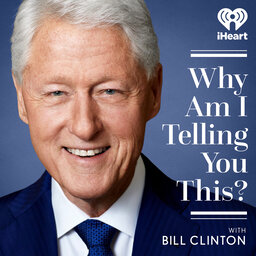Melba Wilson: How Food Feeds Our Soul
There’s a reason a certain type of home-cooked cuisine is referred to as “soul food”—because it nurtures the spirit as well as the body. From the American South to New York City’s Harlem neighborhood, food is an integral part of culture, a symbol of love, and a way to bring family, friends, and strangers together.
On this episode of Why Am I Telling You This?, President Clinton is joined by “America’s queen of comfort food,” Melba Wilson, whose eponymous restaurant has been serving mouth-watering meals in Harlem—where she was “born, bred, and buttered”—since 2005. In addition to nurturing her native community with food, Wilson also takes care of her neighbors in other ways. In 2021, she was instrumental in setting up a mobile COVID vaccination site for Harlem residents, provided meals to thousands of essential workers, and established the Melba’s COVID-19 Employee Relief Fund to provide financial aid to dozens of restaurant workers who found themselves out of work during the pandemic. She is also serving on New York City’s COVID Recovery and Health Equity Task Force.
In 1 playlist(s)
Why Am I Telling You This? with Bill Clinton
President Bill Clinton has always been known for his ability to explain complex issues in a way that…Social links
Follow podcast
Recent clips

Prime Minister Tony Blair: How to Define Our Interdependence
47:36

President Bill Clinton: Reinstate the Assault Weapons Ban Now
08:00

Dr. Jill Biden and Hillary Clinton: How Community Colleges Can Build A Modern Workforce
26:00
 Why Am I Telling You This? with Bill Clinton
Why Am I Telling You This? with Bill Clinton